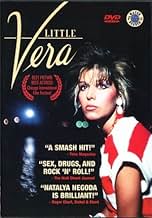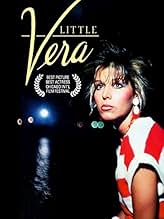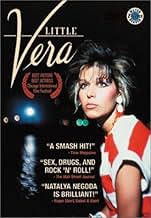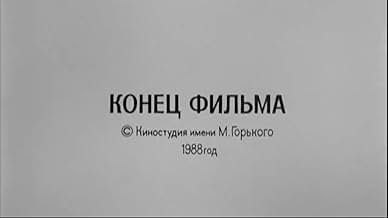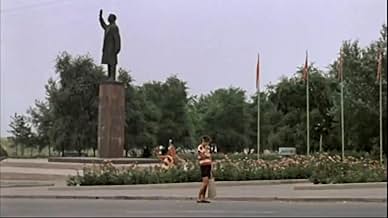NOTE IMDb
6,9/10
2,3 k
MA NOTE
Les frasques de Vera qui habite dans une petite ville industrielle. Vera a quitté l'école jeune et fait les 400 coups, suivant ses désirs afin d'oublier les disputes familiales, son père alc... Tout lireLes frasques de Vera qui habite dans une petite ville industrielle. Vera a quitté l'école jeune et fait les 400 coups, suivant ses désirs afin d'oublier les disputes familiales, son père alcoolique et le sombre avenir qui l'attend.Les frasques de Vera qui habite dans une petite ville industrielle. Vera a quitté l'école jeune et fait les 400 coups, suivant ses désirs afin d'oublier les disputes familiales, son père alcoolique et le sombre avenir qui l'attend.
- Réalisation
- Scénario
- Casting principal
- Récompenses
- 7 victoires et 9 nominations au total
Aleksandr Negreba
- Viktor - brat Very
- (as Alexander Alexseyev Negreba)
Aleksandra Tabakova
- Lenka Chistyakova
- (as Alexandra Tabakova)
Gennady Goryachev
- Sledovatel
- (as G. Goryachev)
Vadim Zakharchenko
- Muzhchina v bolnichnoy palate
- (as V. Zakharchenko)
Mariya Khmelik
- podruga Viktora
- (as M. Khmelik)
Maksim Nayrabe
- brat Lenki Chistyakovoy
- (as Maxim Nairabe)
Avis à la une
One of the major aspects of "Malenkaya Vera" (called "Little Vera" in English) is that it was the first movie from the Soviet Union that featured a sex scene, albeit a short one. The title is important: Vera is the Russian word for "faith", identifying that punk Vera (Natalya Negoda) has little faith in the Soviet system. And as the movie shows, there's not much faith to be had in it. The opening scene shows the bleak industrial town of Zhdanov, nearly a hell on earth. When Vera's lover Sergei (Andrey Sokolov) moves in with her family, it leads to some unexpected events.
Like in many Russian movies, people's names describe their characters. For example, there's Viktor (remember that "victor" means winner). All in all, this is a good look at the Soviet Union while it was collapsing - and we can see why it was collapsing. Really good.
Like in many Russian movies, people's names describe their characters. For example, there's Viktor (remember that "victor" means winner). All in all, this is a good look at the Soviet Union while it was collapsing - and we can see why it was collapsing. Really good.
Vera is a rebellious daughter of dissatisfied proletariat parents. Her father Kolya is an alcoholic. They keep referring to her older brother Victor who is a success in Moscow. They don't like her lifestyle or her friends. She falls for Sergei and decides to marry. It raises the tension in the family. Sergei and and Kolya don't get along. Sergei starts living with the family but it doesn't go well in one violent drunken confrontation.
The film looks pretty grainy and weak compared to most indies of that time. It was sold as the first sex scene in Soviet cinema but there is nothing erotic about this movie. It is gritty, and dirty. The overbearing poverty is the backdrop. That is the more compelling aspect. The story of a rebellious daughter and family dysfunction is not necessarily original. It is somewhat new to see it portrayed about Russia at that time. The movie is filled with a downtrodden sadness and that goes for the lead actress Natalya Negoda. It's fine as a grungy indie and notable for being a Soviet film.
The film looks pretty grainy and weak compared to most indies of that time. It was sold as the first sex scene in Soviet cinema but there is nothing erotic about this movie. It is gritty, and dirty. The overbearing poverty is the backdrop. That is the more compelling aspect. The story of a rebellious daughter and family dysfunction is not necessarily original. It is somewhat new to see it portrayed about Russia at that time. The movie is filled with a downtrodden sadness and that goes for the lead actress Natalya Negoda. It's fine as a grungy indie and notable for being a Soviet film.
Please Note: This review mentions key moments in this film. Do not read if you have not seen the movie!
Vera, the protagonist in the film Little Vera, lives in a closed, cramped world. She is trying to escape, both emotionally and physically, but in the end is no closer to freedom. Most of the reviews I read brought up the recurrent theme of limited space in this movie. The family apartment represents Vera's closed world in the simplest sense. She has no room to move, no room to grow and no room to find herself. Everywhere she turns the finds herself face to face with her mother, father, brother or simply a wall.
However, the family apartment is only one way that the director maintains this constant feeling of confinement. Throughout the film, Vera is rarely shown at a distance. She is always in a small room, or sitting directly next to someone else, or being physically smothered by those around her (Andrei, Sergei, etc.). She is almost always in physical contact with another person. During the rare times that she truly is alone, such as when she is attempting suicide, the camera only zooms in closer. In this way, the lens replaces the walls and smothering humanity, itself becoming an object of confinement.
If visual effects of confinement aren't possible, then sound is used to heighten the sense of disparity. Most of the dialogue in Little Vera, with the exception of less intense moments when the music volume is increased, is shouted, yelled or screamed. Vera's family is constantly in conflict and even the most civil dinner eventually erupts into argument. I found the constant barrage of sound equally as suffocating as the repeated scenes within the tiny apartment, and twice as hard on the nerves. Unlike Vera, however, we could leave when it was all over.
It is hard not to feel sorry for Vera at the end of the movie, but is our sympathy justified? She returns, time and again, to the very apartment and situation that is slowly taking the life out of her. Can she really be considered a victim if she is bringing a lot of her misery upon herself?
Vera, the protagonist in the film Little Vera, lives in a closed, cramped world. She is trying to escape, both emotionally and physically, but in the end is no closer to freedom. Most of the reviews I read brought up the recurrent theme of limited space in this movie. The family apartment represents Vera's closed world in the simplest sense. She has no room to move, no room to grow and no room to find herself. Everywhere she turns the finds herself face to face with her mother, father, brother or simply a wall.
However, the family apartment is only one way that the director maintains this constant feeling of confinement. Throughout the film, Vera is rarely shown at a distance. She is always in a small room, or sitting directly next to someone else, or being physically smothered by those around her (Andrei, Sergei, etc.). She is almost always in physical contact with another person. During the rare times that she truly is alone, such as when she is attempting suicide, the camera only zooms in closer. In this way, the lens replaces the walls and smothering humanity, itself becoming an object of confinement.
If visual effects of confinement aren't possible, then sound is used to heighten the sense of disparity. Most of the dialogue in Little Vera, with the exception of less intense moments when the music volume is increased, is shouted, yelled or screamed. Vera's family is constantly in conflict and even the most civil dinner eventually erupts into argument. I found the constant barrage of sound equally as suffocating as the repeated scenes within the tiny apartment, and twice as hard on the nerves. Unlike Vera, however, we could leave when it was all over.
It is hard not to feel sorry for Vera at the end of the movie, but is our sympathy justified? She returns, time and again, to the very apartment and situation that is slowly taking the life out of her. Can she really be considered a victim if she is bringing a lot of her misery upon herself?
This once notorious drama (at least in its own country) was hailed as a breakthrough when first released simply for daring to show modern Soviet life without the usual State-approved propaganda halo, in all its actual anti-bureaucratic grubbiness. But watching the film on this side of the erstwhile Iron Curtain only reinforces the notion that Soviet youth culture is thirty years behind the rest of the world: despite the often oppressive details it might be just another quaint teen delinquency relic from early 1960s Hollywood, dubbed into Russian and updated with casual sex and drug abuse. In other words, it's hardly a revelation to discover that Russian kids are just as misunderstood by adults as their American role models. But while the attitudes may look dated to Western audiences, it's at least an honest attempt to portray something of the boredom and defiant posturing of youth, in a country not exactly noted for addressing its generation gap.
10fred3f
It is difficult, today and in the US, to understand this movie. We have nothing, really, to compare it with. Here is an attempt at comparison: It is as if during the last years of Saddam's rule, a filmmaker in Iraq were somehow able to make a film, which, for the first time ever, showed life as it really was lived in that country. The life of ordinary young girl, with all the terror and the repression full blown. Then the film was exhibited freely in Iraq. If you could imagine that unlikely event, then you might have an idea of what went on with this film in the last few years of the Soviet Union. Prior to this film, Soviet cinema was highly censored. Soviet movies would only show an ideal life in the worker's paradise. Then suddenly this. The alcoholism, the random sex, the ugly wasteland that was the Soviet city, the choking pollution, the proletariat victimizing each other and themselves, the utter hopelessness - it is all there. People were stunned. Soviet women would often weep during the showings. Many would say that this is the story of their lives. It was a cultural earthquake the like of which filmmakers only dream of accomplishing. It undoubtedly hastened the breakup of the Soviet Union.
Reading the reviews here, I can see that few understand this film. One says it was groundbreaking because it contained real sex. To the Soviet viewers at the time, the sex was a minor event compared to fact that it portrayed reality for the first time in Soviet cinema.
Others compare it to current films such as "As Good as it Gets" Might as well compare Homer's Illiad to the latest John Grissam novel. They simply do not compare. This is not just a film, this is was a social document, and a transforming social force. It needs to be viewed that way or you will not understand the film.
Other reviewers see it as a film about a dysfunctional Russian family. One even says that it is difficult to feel sorry for Vera because she keeps coming back to her family. The point is that Vera and her family are symbols for all of Soviet life. There was nowhere else to go, because the family down the block and in the next town were the same. This was life in the Soviet Union for most people.
This is a film that can be viewed on many levels: as a drama it traces the landscape of despair, as a social document it shows the living conditions of the time, as a political document it shows the attitude of the people and many of the reasons for the break-up of the Soviet Union, and as a moral document it shows the evils of a dictatorship that is out of control, and the cruelties that victims will practice on each other.
Little Vera clearly shows the human toll that Socialism eventually takes on its victims, despite any good intentions that system may have. In doing so it helped end the Soviet regime thus contributing to one of the major changes in modern history. This film achieves what only a few films have ever accomplished. It is not only an stunning representation of history but it also become a force in that shaped history.
Reading the reviews here, I can see that few understand this film. One says it was groundbreaking because it contained real sex. To the Soviet viewers at the time, the sex was a minor event compared to fact that it portrayed reality for the first time in Soviet cinema.
Others compare it to current films such as "As Good as it Gets" Might as well compare Homer's Illiad to the latest John Grissam novel. They simply do not compare. This is not just a film, this is was a social document, and a transforming social force. It needs to be viewed that way or you will not understand the film.
Other reviewers see it as a film about a dysfunctional Russian family. One even says that it is difficult to feel sorry for Vera because she keeps coming back to her family. The point is that Vera and her family are symbols for all of Soviet life. There was nowhere else to go, because the family down the block and in the next town were the same. This was life in the Soviet Union for most people.
This is a film that can be viewed on many levels: as a drama it traces the landscape of despair, as a social document it shows the living conditions of the time, as a political document it shows the attitude of the people and many of the reasons for the break-up of the Soviet Union, and as a moral document it shows the evils of a dictatorship that is out of control, and the cruelties that victims will practice on each other.
Little Vera clearly shows the human toll that Socialism eventually takes on its victims, despite any good intentions that system may have. In doing so it helped end the Soviet regime thus contributing to one of the major changes in modern history. This film achieves what only a few films have ever accomplished. It is not only an stunning representation of history but it also become a force in that shaped history.
Le saviez-vous
- AnecdotesThis was the first Soviet film to depict graphic sexual intercourse on screen.
- Bandes originalesHeaven And Hell
(uncredited)
Written by Dieter Bohlen
Performed by C.C. Catch
Produced by Dieter Bohlen
[plays during playback of the video clip of the same name C. C. Catch]
Meilleurs choix
Connectez-vous pour évaluer et suivre la liste de favoris afin de recevoir des recommandations personnalisées
- How long is Little Vera?Alimenté par Alexa
Détails
Box-office
- Montant brut aux États-Unis et au Canada
- 1 262 598 $US
- Week-end de sortie aux États-Unis et au Canada
- 23 950 $US
- 16 avr. 1989
- Montant brut mondial
- 1 262 598 $US
Contribuer à cette page
Suggérer une modification ou ajouter du contenu manquant

Lacune principale
By what name was La petite Véra (1988) officially released in India in English?
Répondre
